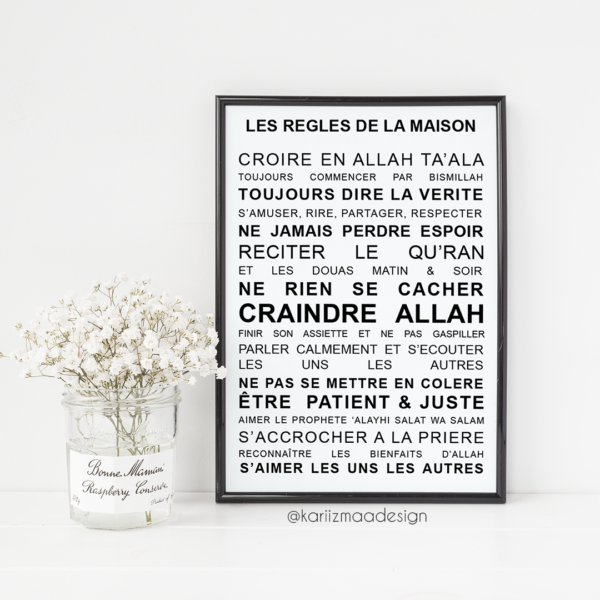Have you ever wondered how Islamic teachings influence the concept of home and family? The phrase "fourmi à la maison islam" might sound a little quirky, but it dives deep into the heart of Muslim households. In this article, we’ll explore the intricate relationship between Islam and the home, uncovering how faith shapes everyday life for millions of people around the world.
Let’s face it—when we talk about Islam, the conversation often revolves around prayer, fasting, or community. But what about the home? The house isn’t just a physical space; it’s a sanctuary where faith comes alive. From the way meals are prepared to the rituals that happen behind closed doors, the Islamic faith plays a pivotal role in shaping the domestic environment.
In this article, we’ll break down the key principles that guide Muslim households, highlight cultural nuances, and provide practical insights for anyone interested in understanding this beautiful intersection of faith and family. So, grab a cup of coffee, sit back, and let’s dive in!
Read also:Hannah Uwu Dead Photo
Table of Contents
- The Importance of Home in Islam
- Core Principles of an Islamic Home
- Daily Rituals and Practices
- Islamic Home Architecture
- Family Dynamics in Muslim Homes
- Hospitality and Welcoming Guests
- Cleanliness: A Pillar of Faith
- Modern Challenges for Muslim Homes
- Benefits of an Islamic Home Environment
- Wrapping It All Up
The Importance of Home in Islam
Let’s start with the basics. In Islam, the home is more than just four walls and a roof—it’s a sacred space. The Prophet Muhammad (peace be upon him) emphasized the importance of creating a peaceful and harmonious environment within the household. This idea is deeply rooted in the Quran and Hadith, where the home is described as a place of refuge and comfort.
Think about it—when you come home after a long day, don’t you want it to feel like a safe haven? For Muslims, this feeling is amplified by the spiritual connection they have with their living space. Whether it’s the sound of the adhan echoing through the house or the scent of incense wafting through the air, every element of the home serves a purpose in nurturing the soul.
But here’s the kicker—the concept of home in Islam isn’t just about physical comfort. It’s about fostering relationships, building character, and instilling values. From the moment a child is born, the home becomes a classroom where lessons of faith, kindness, and responsibility are taught.
Why the Home Matters
Let’s break it down even further:
- The home is where faith is practiced daily.
- It’s the foundation for raising righteous children.
- It’s a space where family bonds are strengthened.
- It’s a reflection of one’s relationship with Allah.
So, if you’re thinking that the phrase "fourmi à la maison islam" is just about ants in the house (which, by the way, is a fun twist), you’re missing the bigger picture. It’s about the ants—or challenges—that we face in our spiritual journey and how we overcome them within the confines of our homes.
Core Principles of an Islamic Home
Now that we’ve established the significance of the home in Islam, let’s dive into the core principles that guide Muslim households. These principles aren’t just rules; they’re a way of life that helps create a harmonious and spiritually enriching environment.
Read also:Nick Offerman Kids
H3: Faith as the Foundation
At the heart of every Islamic home is faith. The Quran and Hadith serve as the guiding light, shaping every decision and action within the household. From the way meals are prepared to the way conflicts are resolved, faith is the foundation upon which everything else is built.
For example, did you know that Muslims are encouraged to begin every task with the phrase "Bismillah" (In the name of Allah)? This simple act reminds them of the divine presence in their daily lives. It’s not just about saying the words—it’s about living them.
H3: Respect and Etiquette
Respect is a key component of any Muslim household. This includes respect for elders, siblings, and even the physical space itself. For instance, it’s considered improper to step on the Quran or treat religious artifacts with anything less than reverence.
Etiquette also extends to how family members interact with one another. Politeness, kindness, and patience are virtues that are highly valued in Islamic homes. Think of it like this—if you’re having a disagreement with your sibling, the goal isn’t to win the argument—it’s to find a solution that honors both parties.
Daily Rituals and Practices
One of the most fascinating aspects of an Islamic home is the daily rituals that take place. These practices aren’t just about fulfilling religious obligations—they’re about creating a rhythm of life that aligns with spiritual principles.
H3: Prayer and Worship
Prayer is the backbone of any Muslim’s day, and the home is often the primary place where this happens. Whether it’s the five daily prayers or the optional night prayers, the home becomes a sanctuary for worship. Many families designate a specific area in their house as a prayer space, complete with a prayer mat and Quran.
And let’s not forget the role of children in these rituals. From a young age, they are encouraged to participate in prayers and learn the importance of connecting with Allah. It’s not just about teaching them the mechanics of prayer—it’s about instilling a sense of purpose and devotion.
H3: Family Time and Bonding
Family time is another crucial aspect of daily life in an Islamic home. Whether it’s sharing a meal together or engaging in meaningful conversations, these moments help strengthen the bonds between family members.
For example, many Muslim families gather for iftar during Ramadan, breaking their fast together and sharing in the joy of community. These moments aren’t just about food—they’re about creating memories and deepening relationships.
Islamic Home Architecture
When it comes to the physical design of an Islamic home, architecture plays a significant role. The layout and features of the house are often influenced by cultural and religious considerations, creating a space that is both functional and spiritually enriching.
H3: Privacy and Modesty
Privacy is a key concern in Islamic homes, and this is reflected in the design of the house. Many homes feature separate areas for men and women, as well as designated spaces for guests. This ensures that everyone feels comfortable and respected within the home.
Modesty is also a guiding principle, with many homes incorporating features like screens or curtains to maintain privacy. It’s not about being secretive—it’s about creating a space where everyone can feel at ease.
Family Dynamics in Muslim Homes
Family dynamics in Muslim homes are shaped by a combination of cultural traditions and religious teachings. This creates a unique environment where love, respect, and responsibility go hand in hand.
H3: The Role of Parents
Parents play a crucial role in shaping the values and beliefs of their children. They are seen as the primary educators, responsible for teaching their children about Islam and helping them navigate the complexities of life.
For example, many Muslim parents emphasize the importance of education, encouraging their children to pursue knowledge and excel in their studies. This is rooted in the Islamic belief that seeking knowledge is a form of worship.
H3: Sibling Relationships
Sibling relationships are also highly valued in Muslim homes. Siblings are encouraged to support one another, resolve conflicts peacefully, and work together as a team. This fosters a sense of unity and cooperation that extends beyond the home and into the wider community.
Hospitality and Welcoming Guests
Hospitality is a cornerstone of Islamic culture, and this is especially true in the home. Muslims are encouraged to welcome guests with open arms, offering them food, drink, and a warm smile.
For example, many Muslim homes have a designated area for guests, complete with comfortable seating and refreshments. This creates a welcoming atmosphere that makes visitors feel valued and appreciated.
Cleanliness: A Pillar of Faith
Cleanliness is often referred to as "half of faith" in Islam, and this principle is reflected in the home. Whether it’s maintaining a tidy living space or practicing personal hygiene, cleanliness is a top priority for Muslim households.
H3: Physical Cleanliness
Physical cleanliness includes everything from keeping the house clean to maintaining personal hygiene. Many Muslims have specific routines for cleaning their homes, using natural products and eco-friendly methods whenever possible.
H3: Spiritual Cleanliness
Spiritual cleanliness is equally important, and this involves purifying the heart and mind through prayer, reflection, and good deeds. It’s about creating a space where both physical and spiritual cleanliness coexist harmoniously.
Modern Challenges for Muslim Homes
While the principles of an Islamic home are timeless, modern life presents its own set of challenges. From balancing work and family responsibilities to navigating cultural differences, Muslim households face unique obstacles in today’s world.
H3: Technology and Social Media
Technology and social media have become an integral part of daily life, but they can also pose challenges for Muslim families. The key is finding a balance that allows for the benefits of technology while maintaining the spiritual essence of the home.
H3: Cultural Integration
For many Muslim families living in non-Muslim countries, cultural integration is a delicate balancing act. It’s about embracing the best of both worlds—maintaining Islamic values while also respecting the cultural norms of their surroundings.
Benefits of an Islamic Home Environment
Despite the challenges, there are countless benefits to creating an Islamic home environment. From fostering strong family bonds to instilling a sense of purpose and direction, the rewards are immeasurable.
H3: Spiritual Growth
Living in an Islamic home provides a fertile ground for spiritual growth. Whether it’s through daily prayers, family time, or community service, the home becomes a space where faith is nurtured and strengthened.
H3: Emotional Well-being
Emotional well-being is another benefit of an Islamic home environment. The emphasis on respect, kindness, and patience helps create a peaceful and harmonious atmosphere that promotes mental and emotional health.
Wrapping It All Up
As we’ve explored the concept of "fourmi à la maison islam," it’s clear that the home plays a vital role in shaping the lives of Muslims around the world. From the core principles that guide daily life to the challenges and benefits of modern living, the Islamic home is a testament to the beauty and depth of faith.
So, whether you’re a Muslim looking to deepen your understanding of your faith or someone curious about the intersection of religion and family, this article has hopefully provided valuable insights. Remember, the home is more than just a physical space—it’s a sanctuary where faith, love, and community come together.
Now it’s your turn! Leave a comment below and let us know what you think about the role of faith in shaping the home. Or better yet, share this article with a friend and start a conversation. Together, we can build a community that celebrates the beauty of faith and family.


